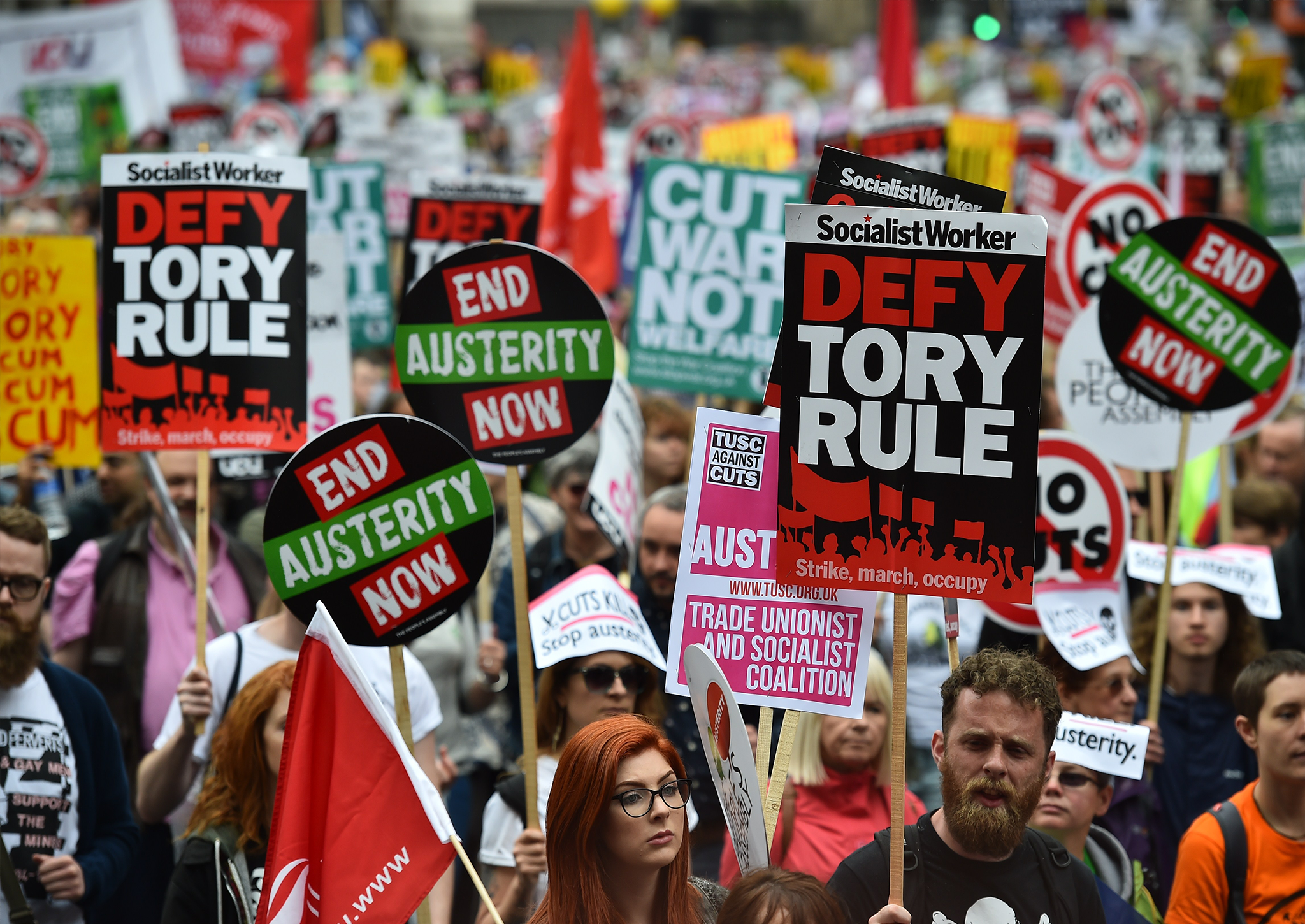Austerity is essential if Britain wants to reduce inequality – why can't the left-wingers who march against it realise this?
I'm not for stripping public services to the bone, but I am willing to accept reality

Your support helps us to tell the story
From reproductive rights to climate change to Big Tech, The Independent is on the ground when the story is developing. Whether it's investigating the financials of Elon Musk's pro-Trump PAC or producing our latest documentary, 'The A Word', which shines a light on the American women fighting for reproductive rights, we know how important it is to parse out the facts from the messaging.
At such a critical moment in US history, we need reporters on the ground. Your donation allows us to keep sending journalists to speak to both sides of the story.
The Independent is trusted by Americans across the entire political spectrum. And unlike many other quality news outlets, we choose not to lock Americans out of our reporting and analysis with paywalls. We believe quality journalism should be available to everyone, paid for by those who can afford it.
Your support makes all the difference.British history is littered with examples of famous protests and demonstrations, from the Peasant’s Revolt in 1381 to the Poll Tax riots in 1990. Organised action has the potential to bring about great change, as indeed it has done for many great causes in the past.
However, the misguided cacophony that was the "anti-austerity rally" in London last Saturday will not join these events as a great movement for change in British society. I did not watch the events of the day unfold and feel inspired or moved. I was not roused by this display of direct action. And I certainly did not feel inclined to join in.
Calling for a complete end to austerity is unrealistic, unfounded and irresponsible, and it would lead to an appalling state of affairs for generations to come. Economic circumstances dictate that "austerity" is absolutely necessary. Britain’s national debt currently stands at a horrifying £1.5 trillion. When interest rates inevitably rise, continuing to "borrow to invest" will quickly become unsustainable as this number rockets ever higher; it should not be controversial to assert that this is downright irresponsible.
Short of taking more money away from those who have worked hard to earn it, spending cuts in some form are the only viable option to get the nation’s finances under control and the UK running a balanced budget. With a balanced budget, the Government will be in a more sustainable position to re-invest in public services and lower taxation for all parts of society, finally working to reduce inequality. This will not happen with a ballooning national debt looming over us.

But it seems this reality isn’t important for those who marched on Saturday. Last weekend's rally wasn't exactly the moral defence of the most vulnerable people in society which it sold itself as. It was more an excuse for those who are unhappy with the outcome of May’s election to sound off among like-minded company. All manner of placards were proudly waved high from the hands of protesters, boldly stating messages ranging from "EDUCATION IS NOT A COMMODITY" to "DEFY TORY RULE" to "END AUSTERITY NOW". The Green Party even chipped in with a number of demands including "NO NUCLEAR". This was clearly not an event with a coherent logical front.
Perhaps the most perplexing demand was "TORIES OUT NOW". Nearly two months after the election, there remain those who continue to contest the result as illegitimate. Unfortunately for them, the Conservatives won a clear majority with the same voting system as every other government before it — including Blair’s three victories from 1997.
As such, all credibility the anti-austerity movement may have had is completely negated by a fundamental inability to accept the real-world state of affairs. As some have already pointed out, 88 per cent of the votes cast in May were for pro-austerity parties. Thirty-seven per cent of votes were for the Conservative party alone. As much as anti-austerity campaigners may argue otherwise, this march did not represent the prevailing public opinion.
Also, what kind of messages do events like these send to young people with an interest in politics? Instead of being inspired by constructive and civil debate, they are subjected to scenes of disorder and unrest — and, all too often, violence.

On Saturday, signs were set alight in the middle of Parliament Square, flares were set off and smoke bombs were thrown along streets. Rufus Hound turned up with a sex doll superimposed with the Prime Minister’s face. Earlier this year, a war memorial was defaced with the words "FUCK TORY SCUM" and Ukip MP Douglas Carswell was mobbed and threatened with violence in broad daylight. Impressionable young minds are told to believe that this kind of behaviour is acceptable; that to argue your point of view with violence and aggression is noble and justified.
As if that weren’t enough, we must also suffer the hypocrisy of multi-millionaires Russell Brand and Charlotte Church lecturing on inequality. We have to hear Labour leadership contender Jeremy Corbyn claim that austerity is a "cover" for deepening inequality, spreading the misleading and unfounded argument that Conservatives take pleasure in seeing the poor in society suffer.

Of course, this kind of behaviour and language comes from a small minority and is far from representative of most with left-wing views. But it only takes a minority to make an impression, and it must be dealt with before demonstrations like this can be considered the frontiers of morality they claim to be.
This is all not to say, of course, that there is no place for disagreement or dissent around austerity. I am also not advocating stripping all public services to the bone and privatising core government functions, as many who are "anti-austerity" seem to believe is happening. But calling for an end to all austerity is not an argument grounded in economic reality, and protesting is never going to achieve meaningful change or scrutiny.
It’s time to quit the marching, and start making constructive contributions to the debate, focusing on where and how cuts should fall to ensure austerity remains responsible and effective. This can be done via lobbying MPs, joining interest groups, signing e-petitions and, of course, voting. The campaigning doesn't need to end, but for it to maintain any credibility it should shift its focus.
Join our commenting forum
Join thought-provoking conversations, follow other Independent readers and see their replies
Comments